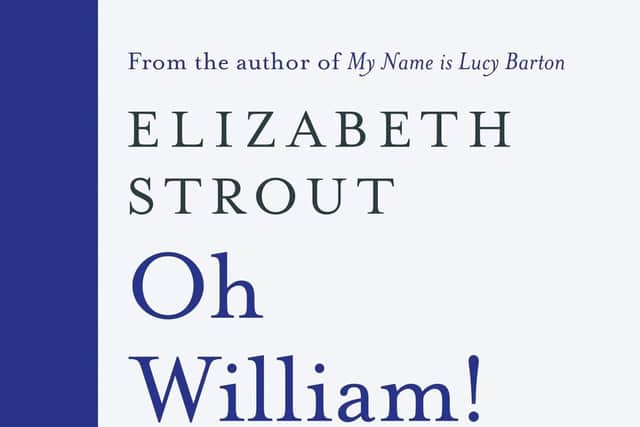Book review: Oh William! by Elizabeth Strout


Elizabeth Strout has a novelist’s most desirable quality: a distinct voice. Hers is quiet, conversational, intimate. It allows her to move easily between now and then.
Her narrator, Lucy, is herself a novelist, sufficiently successful for the public library staff in a small town in Maine to recognise her and bring out copies of all her novels for her to sign when she makes an unheralded visit.
Advertisement
Hide AdThis is Strout’s third Lucy Barton novel, and I would guess, and hope, there will be more to come.


Lucy’s second, and adored, husband has recently died. William was her first one, she his second wife; in the course of this novel his third one will leave him. Lucy and he are still, or again, good friends. They have two grown-up much loved daughters. There’s a lot of family love in this novel, as well as mysteries and difficult childhoods, for Lucy was brought up poor at a wretched farm in Illinois, and there was little love in her upbringing.
William is an academic, a chemist, now retired from teaching but still with his own laboratory. Though married again, it is to Lucy that he turns when he starts experiencing night terrors. His mother features in these.
Catherine was a strong-minded and beautiful woman who had left her first husband for William’s father, a German prisoner of war, working in the potato fields of Maine.
William knows little of Catherine’s origins – he will find out more on a trip to Maine taking with him Lucy after he learns that he may have a half-sister living there.
Rural Maine is harshly described, a place where the American dream seems to have died.
Advertisement
Hide AdLucy, when first married to William, was rather daunted by Catherine, a stylish, self-assured lady who played golf at the country club, but failed to persuade Lucy to take up the game. Catherine is now dead. Her story and her influence are at the heart of the novel.
Americans long pretended that there was no class system in the USA. The pretence, or wilful ignorance, was natural, for the founding document of the Great Republic declares that all were born equal. But it is of course nonsense and, unusually, class is central to this novel.
Advertisement
Hide AdLucy has come to love New York; it represents her escape from poverty and the low aspirations in which it holds its victims. She treasures her escape, yet feels guilty. She remembers times early in her marriage to William when they were living in Greenwich Village and she felt terrible when she thought about her parents “and the feeling that I had left them behind – as I had.” The shadow of a mother who loved her but never hugged her, and resented her escape from the miserable farm, still lies over her.
Lucy and William have formed a friendship that has survived their divorce. She never loved him as deeply as she loved her second husband, David, and with him life was more complete than it had been with William.
Yet now, it is clear that Lucy and William matter more to each other than they did when they were husband and wife. Strout unravels the mysteries of relationships deftly. Perhaps these mysteries are never – can never – be fully resolved; but they can be lived with and that is a step towards understanding and acceptance.
This is a novel that searches for the truth of these things. It is written with the lightest of hands as we follow Lucy’s flickering thoughts. There are many fine scenes, notably Lucy’s meeting with the discovered half-sister in her cherished home, a half-sister who speaks of a Catherine different from the woman Lucy knew.
Talking with her daughters, Lucy reflects that “it was strange to think of their grandmother having this life that they knew nothing about, that neither I nor William had known anything about.” But this, of course, is how it is in families.
This is a delightful novel. It rattles along so easily and agreeably in Lucy’s voice that it is only gradually that you realise how intelligently it examines the lives of its characters. The easy reading it offers is evidence of Strout’s technical mastery.
Oh William!, by Elizabeth Strout, Penguin, 256pp, £14.99
A message from the Editor:
Advertisement
Hide AdThank you for reading this article. We're more reliant on your support than ever as the shift in consumer habits brought about by coronavirus impacts our advertisers.
If you haven't already, please consider supporting our trusted, fact-checked journalism by taking out a digital subscription at https://www.scotsman.com/subscriptions